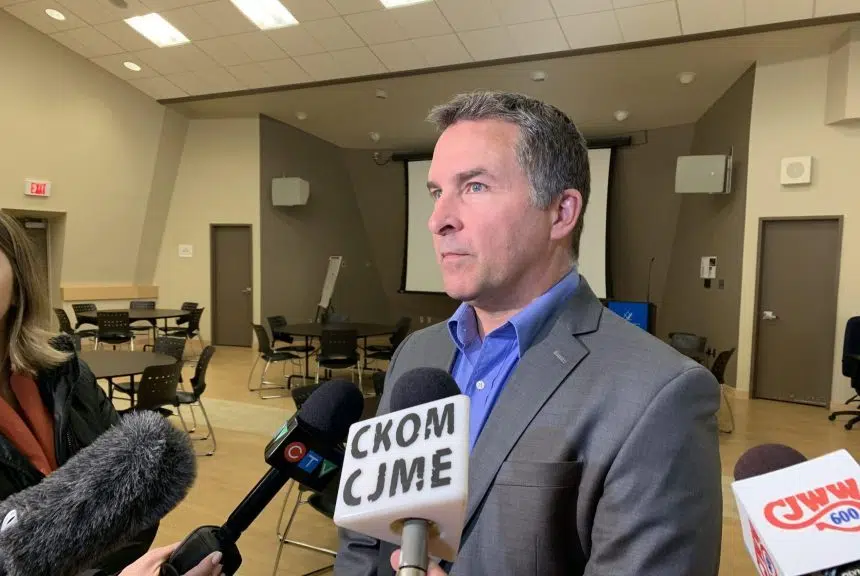Saskatchewan Teachers’ Federation president Patrick Maze didn’t hold back his — or the federation’s — feelings on the province’s new back-to-school plans Tuesday.
Speaking in a Zoom conference just over an hour after the government’s plans were released, Maze set the record straight.
“(This was) yet another announcement on education that still leaves more questions unanswered than answered,” he said.
“It seems like a squandered opportunity to bring some relief and confidence to teachers, school workers and parents. So much is still left optional, and left up to chronically underfunded school divisions to implement.”
Maze said questions such as how many buses will be outfitted with Plexiglas and who will be doing all of the extra cleaning came to him almost immediately after the release.
He didn’t give an answer to buses being outfitted; that’s going to fall on individual school divisions.
As for cleaning, Maze had an answer for that.
“It’s easy to suggest that extra cleaning should be done, but (it won’t be easy) given that at least one school division just recently laid off (cleaning) staff, and others have pared down maintenance and cleaning staff to bare bones minimal cleaning for several years now,” he said.
“We know that teachers won’t be able to do that work because they will be busy addressing the educational needs of students.”
Maze spoke often about the “significant educational gaps” imposed by the early end to the 2019-20 school year. Schools were closed in March due to COVID-19, ending in-person learning.
He said addressing those gaps will be teachers’ main focus in the fall, along with ensuring the mental health needs of each student are met.
When it comes to crowded classrooms, and how things should be configured in them, Maze said even before the pandemic, there was little room for teachers to circulate.
If students end up with COVID-19 symptoms, another unanswered question is who will be teaching them, according to Maze.
“There seems to be no specific direction on what happens when a child or several children must stay at home for several weeks because they’re not feeling well … Who will be handling their education?” he said.
Maze also said the STF has been told that will not fall on the teachers. They can’t do double duty of both in-class and online learning.
Another major topic that was discussed included mandatory mask-wearing. Maze made his point clear on the issue.
“Sourcing (masks) is a step in the right direction,” he said. “However, (the province) should be implementing them as mandatory for all students right from Pre-K to Grade 12.”
He says the three-week window to prepare for school is now here, and it would have been nice to get some of the younger students used to wearing a mask prior to school being in session.
“Is there going to be a stress at the last minute? As the second wave hits and a spike in numbers, all of a sudden it’s determined (that) students have to wear them,” he explained.
“Without knowing at what level (measures will be increased), we’ve seen (case) numbers increase steadily for the last little while here in Saskatchewan. So why would we not decide right now that we’re going to more extreme measures? (It’s) the idea of how many students need to get sick before we take this more seriously.”
Maze said the STF had one seat on the province’s Response Planning Team committee. The decision ended up falling with the government and the chief medical health officer, according to Maze.
Maze also spoke of the possibility that schools may end up with a shortage of teachers.
With some having underlying health conditions, he said he has told members that if they know they could be immunocompromised, they need to get to a doctor to assess the situation.
“Be sure that you are safe going back in September. If it’s a substantial enough issue that you need some sort of accommodation in the workplace, then that needs to be done pretty soon,” he explained.
“Maybe that means some schools go a little overstaffed at this point, starting in September and in order to be able to redistribute them as the situation unfolds.”
He said other issues with a low turnout of staff is the age of many substitute teachers. He said that may make them more susceptible to being immunocompromised.
Maze added the STF is aware of situations, even pre-pandemic, regarding shortages of substitutes.
“One school division had such a chronic shortage of substitute teachers, they ran short of substitute teachers every day for over three straight months last year,” he said.
Maze said he didn’t believe the plans announced Tuesday afternoon were biased towards rural or urban learning settings. He said the virus is not selective of either setting or age of the student.
With all the uncertainty imposed on educators at this point, Maze made another aspect clear for all educators: “Teachers want to get into their classrooms. Teachers want to be in front of their students. We just want to make sure it’s done as safely as possible.”







